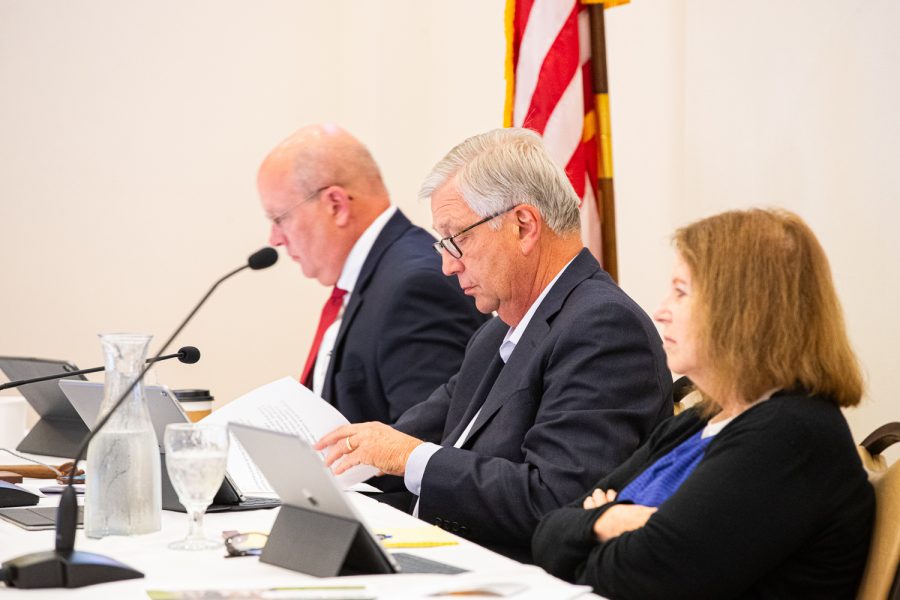Regents approve tuition freeze for fall 2020 semester, student leaders urge for similar action in spring
Among economic uncertainty due to the novel coronavirus pandemic and social distancing restrictions, the state Board of Regents voted to freeze tuition for the 2020-21 academic year. Student leaders are asking the regents to consider the impact of future increases on students.
Iowa Board of Regents President Michael Richards sits alongside President Pro Tem Patty Cownie during a meeting at the Iowa State Alumni Center in Ames, Iowa, on Thursday, June 6, 2019. The Regents voted in favor of a four percent tuition increase starting in the fall semester of 2019.
June 4, 2020
The state Board of Regents heard from student government leaders at the University of Iowa, Iowa State University, and the University of Northern Iowa about the proposed tuition freeze for the fall 2020 semester on Thursday, voicing concerns about the possibility of a mid-year tuition increase.
The regents passed a tuition freeze for the 2020-2021 academic year due to financial uncertainty created by the COVID-19 pandemic, however, regent documents stated the tuition and fees may be re-evaluated for the spring 2021 semester.
UI Graduate and Professional Student Government Governmental Relations Chair Paul Esker said GPSG supports the implementation of a tuition freeze for the fall semester, but asked the regents to consider the impact a mid-year tuition increase could have on students.
Esker said he feared a mid-year tuition increase, and also concerned that a full-year tuition freeze will be “insufficient against the backdrop of 20 years of skyrocketing tuition.”
Esker said GPSG urged the regents to extend the tuition freeze through the spring semester sooner rather than later. He said many graduate and professional students complete their degrees in consecutive semesters.
“We’re not taking semesters al la carte,” Esker said. “It will be jarring for many students if this tuition freeze is lifted for the spring semester, especially if tuition increases dramatically.”
Many students won’t have a choice to take a semester off for financial reasons, he said, because of the way their degree programs are structured. A mid-year tuition increase will also impact the financial planning students do at the beginning of each year, he added.
RELATED: Iowa regents recommend no tuition hikes amid ‘unprecedented’ COVID-19 uncertainty
A single-semester freeze is insufficient in the generational economic crisis, Esker said, along with a continued disinvestment in higher education in Iowa. Some students and their families have lost their jobs due to the novel-coronavirus pandemic, he added, and will not recover from this crisis in six months.
Esker acknowledged that faculty can be harder to retain if revenue declines, but believed that’s where state appropriations should interfere.
“A one-semester tuition freeze is a very positive step, but I fear it will not be enough,” Esker said.
UI Undergraduate Student Government President Connor Wooff began his comments on tuition by addressing current protests taking place in Iowa City against police violence toward black people, sparked by the death of George Floyd in Minneapolis on May 25. Police in Iowa City used flash-bangs and tear gas to disperse a crowd of peaceful protesters Wednesday.
RELATED: Police use tear gas and flash bangs on protestors marching toward I-80 in Iowa City Wednesday night
“The murder of George Floyd is not just another event, another news story. It’s a reality that some of our students at Iowa experience every day,” Wooff said. “Racial injustice today has become more subtle, more discreet, and deeply rooted in our everyday life.”
The student governments at the UI have been in communication with each other and with university administration to address the events of Wednesday and support students, Wooff said.
Students have lost experiences and jobs, and some have moved home to environments that may be stressful for them, Wooff said, and they have fears about the future and the safety of family members.
Although the campus community has faced immense struggle, the support shown by students, faculty, staff, and administration has been tremendous, Wooff said. He added that student organizations have donated their remaining funds to the Dean of Students Support Fund, allowing more students to have economic support.
“While our university came together this semester, our push for economic relief cannot be over,” Wooff said. “Students at the University of Iowa are still struggling and hurting because of the global pandemic, perpetual racial injustice, and the immense uncertainty about what is to come. Students need our support and our thoughts, but not just our actions.”



